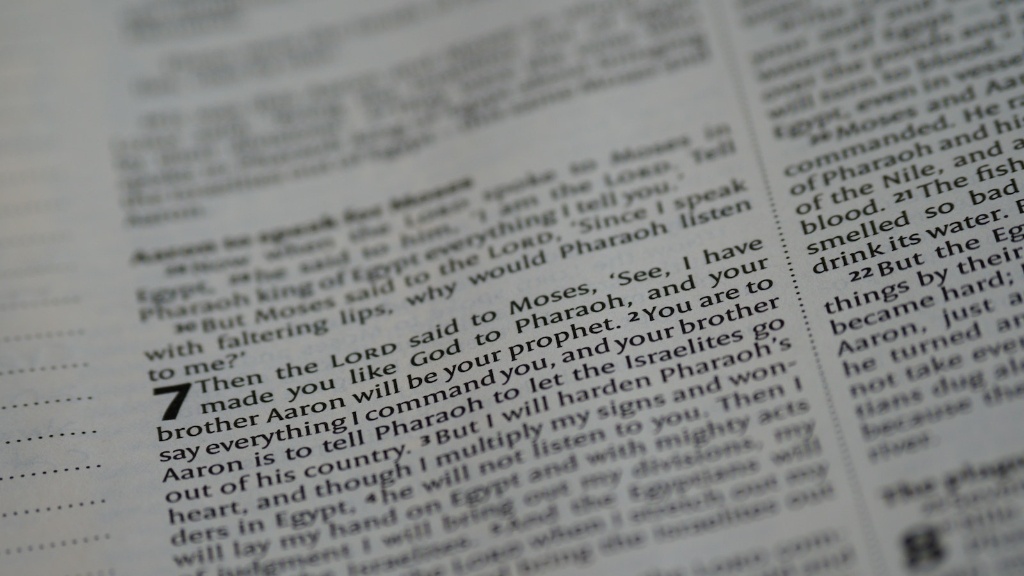What Does The Bible Actually Say About Purgatory?
Purgatory is a controversial concept in Christianity that has long been the subject of debate and discussion. In spite of its contested history, the concept of purgatory is believed by some Christians to be a realm of purification that prepares a person for heaven after death. While the concept is not found in the Bible, some argue that it is a legitimate interpretation of scripture. To truly understand its relevance in Christianity, it is important to understand what the Bible actually says about purgatory.
The Bible does not actually refer to purgatory by name. In many Christian denominations, the concept is interpreted through various scriptures. For example, a popular interpretation is based on passages in 2 Maccabees 12:46 which suggests that prayer and sacrifices can help those in purgatory. Additionally, some biblical passages refer to purgatory as a place of purging and sanctification. For example, Isaiah 4:3-4 reads: “And it shall come to pass that he who is left in Zion and remains in Jerusalem will be called holy, even everyone who is written among the living in Jerusalem…and the Lord will create upon every dwelling place of Mount Zion and upon her assemblies a cloud and smoke by day and a shining of flaming fire by night…”
Other Christian traditions also have their own interpretation of what purgatory is. For instance, Catholics believe in a purgatory that prepares a person for entry into heaven by taking away his sins through a process called “purification.” Catholis belief locates purgatory in the afterlife and not before entry into the Kingdom of Heaven. The Catholic Church also teaches that those in purgatory are pardoned from the temporal punishment for their sins, implying that some kind of reparation for sins takes place.
The Protestant church does not accept the concept of purgatory found in Catholicism and many other denominations. This is because, according to many Protestants, the concept goes against the Bible and is a tradition of man, which is seen as incompatible with biblical teaching. This is because religions such as Protestantism reject the idea that any type of works or rituals can be used to attain salvation and instead insist on the primacy of faith and grace.
The topic of purgatory is an ongoing source of dispute in Christianity and continues to divide church denominations. Most Christians still disagree over what the Bible actually says regarding the state of purgatory. For example, there is debate over the interpretation of certain passages of scripture. Additionally, many denominations have their own tradition-based theology when it comes to purgatory, and as a result, there is a wide range of opinion on this issue.
It is important to note that even among Christians who believe in the concept of purgatory, there are debates about how it works and how long a person will be in it. One thing is certain, the concept of purgatory is seen by some as an important part of the Christian journey into the afterlife. For those who accept the teachings of purgatory, the goal is to find harmony between the teachings and the Bible in order to be purified in the afterlife.
Support That The Bible Gives To Purgatory
There are a few key Bible verses which authors Theologians point to as supporting the concept of purgatory and the idea that we still have time after death to repent and make up for any wrongdoings. For example, 1 Corinthians 3:11-15 speaks of a temporal fire that purifies the quality of our works that we bring with us beyond the grave.
Additionally, Romans 13:11-14 is another popular reference point for those who believe in purgatory, as it mentions that we must do what is necessary to prepare ourselves for the Day of Judgment. In essence, this means making sure our souls are transformed and purified in a special way.
Those who interpret Matthew 12:31-32 as referring to purgatory, explain that this passage speaks of how sinners can still be forgiven after doing wrong and how this needs to take place following death. There is also support from 1 Peter 3:19-20 and four Specific Catholic prayers for the dead which Theologians explain can help those in purgatory.
Ultimately, although there are clearly some biblical passages which suggest the possibility of purgatory, this is still a hugely contested theological concept in Christianity. With conflicting interpretations, it is important to consider what purgatory means and why it matters to Christianity before taking a stance.
Theological Arguments For Purgatory
Proponents of purgatory often turn to the concept of justice to explain their reasoning. Those who argue in favor of purgatory suggest that although our sins can be forgiven, some punishments are still necessary. If someone’s sins are not adequately punished, then the concept of justice is undermined and God’s holiness is not respected.
Theological arguments also suggest that purgatory has a role to play in allowing Christian believers to be ‘sanctified’ or made holy. Some teachings propose that purgatory offers the opportunity to cleanse and purify the soul for entry into Heaven. This is often compared to a smith creating a beautiful and resilient sword from iron, which needs to be tested and tempered before entering its final phase of refinement.
For those who believe in the concept of purgatory, the hope is that it provides a way to become ‘whole’ with God. This is often seen as a slow and gradual process, in which each individual must travel through the spiritual realm and make peace with God.
Overall, whether one believes in the concept of purgatory or not, it is essential to understand the theological arguments that support it. This is because the concept of purgatory is a highly contested issue in Christianity and disagreement among theologians remains.
Views Of Opposers To The Idea Of Purgatory
Those opposed to the concept of purgatory often point to the Bible as evidence that there is no need for any intermediary state between Heaven and Earth. They suggest that if purgatory exists, then this implies that a person’s righteousness must not be perfect at the moment of death. These opponents also suggest that if there was a need for purgatory to make amends, then this would mean that the power and justice of God is not absolute.
Opposers to purgatory often draw attention to the New Testament, which speaks of Heaven and Hell as a pair of ultimate destinations that have no in between. The moralistic principle of the New Testament is to turn away from evil and put one’s faith in Jesus Christ. This would appear to bypass any need for a third spiritual realm or transitionary place.
In addition, some opponents suggest that the idea of purgatory is an invention by the Catholic Church. This is because the concept does not appear in the Bible. For example, numerous passages from the Bible make it clear that once someone dies, this will determine their eternal fate.
Ultimately, the notion of purgatory is highly contested. This is largely because the Bible does not explicitly mention the concept, leading different Christian denominations to adopt their own perspective.
Alternative Explanations To Purgatory
Many Christians have come up with various alternative explanations to purgatory, which largely reject the idea of a ‘middle’ spiritual realm between Heaven and Hell. For example, some suggest that when a sin is forgiven, but there is still an element of ‘earthly’ punishment attached to it, then this punishment will still take place even if the individual is already in heaven. This could take the form of shame, regret, or an inability to fully enjoy the joys of Heaven.
Others have proposed that punishment of sin takes place after repentance. This means that some people may choose to repent and be forgiven by God on their deathbeds. Both Catholics and Protestants accept the notion of ‘afterlife repentance’ and point to Jesus’ parables, such as the one found in Luke 15:11-32, as example.
In addition, those opposed to purgatory often turn to the doctrine of the communion of saints. This is the belief that although we are all sinners, through the grace of Jesus Christ, believers still commune with one another. Therefore, prayers from living believers can help purify the souls of those who have died.
Ultimately, while the Bible is often seen as a source of disagreement over the concept of purgatory, various alternative explanations suggest a way of reconciling the teachings of scripture and the doctrines of different Christian denominations.
Theological Implications Of Purgatory
The idea of purgatory has many implications for the way Christians understand salvation and the journey they take towards it. It is important to note that regardless of the views someone might hold, purgatory is seen as a way of sanctifying and making holy the individual, rather than providing a way to earn salvation.
The concept of purgatory forces believers to think about how long the process of sanctification might take beyond death. As purgatory suggests a period of waiting until the soul is perfectly ready for Heaven and no sin remains, many Theologians suggest that the process could take weeks, months or even years.
The concept of purgatory is often seen as a divine solution to the problem of sin and suggests that those who died in a state of sin can still be forgiven. This invites Christians to think more carefully about forgiveness and allows them to view death with a more positive lens, rooted in the notion that souls can still be redeemed even after they have passed away.
Theological considerations of purgatory invite us to consider our own mortality and the implications of our actions while still alive. It also invites us to think about what happens to us after death and how our faith in God can help us on our journey to salvation.
Conclusion
In conclusion, although the Bible does not explicitly mention purgatory, the concept still has a place in the minds of many Christians. As a contested issue, the debate about purgatory continues to be an important one in Christian theology and it is crucial to consider what the Bible says about it, what theological implications it has, and what alternative explanations exist before taking a stance.





